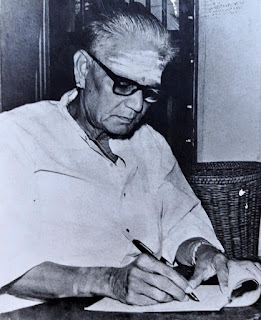Poets and Pancakes Class 12 Summary | Themes & Explanation
Last Updated At: 19 Jan 2026
12 min read

Poets and Pancakes is an intriguing prose chapter that takes readers behind the scenes of Gemini Studios, exploring the world of cinema, creativity, and human emotions. Written with wit and insight, the chapter presents a vivid picture of the film studio, its makeup department, and the talented individuals who contributed to filmmaking, especially Kothamangalam Subbu. Through humor, satire, and rich descriptions, the chapter highlights the contrasts between creativity and envy, talent and recognition, and leisure and diligence.
This Poets and Pancakes summary for Class 12 is designed to help students understand the key events, characters, and themes of the chapter. It breaks down complex ideas into simple, clear explanations, making it easier for learners to grasp the essence of the story. By going through this summary, students can confidently analyze the chapter, appreciate the nuances of the narrative, and prepare effectively for exams.
Summary of the Chapter
The chapter Poets and Pancakes provides a fascinating glimpse into the workings of Gemini Studios, one of the most iconic film studios of its time, while also highlighting the literary and creative talents that coexisted within its walls. The narrative focuses on the lives of various individuals in the studio, from the make-up staff to poets and story writers, blending humor, satire, and social commentary to offer readers a vivid portrayal of the film world.
Introduction to Gemini Studios and Pancake Makeup
The chapter opens by introducing Pancake, the brand of make-up used extensively in Gemini Studios. From stars like Greta Garbo and Vyjayantimala to lesser-known actors, Pancake played a crucial role in transforming appearances for the camera. The make-up department itself was located in an old building believed to have once been Robert Clive’s stables, reflecting the blend of history and modernity that characterized the studio.
The department had the look of a hair-cutting salon, with multiple mirrors surrounded by incandescent lights, creating a “fiery misery” for those receiving make-up. The chief make-up artist headed a structured hierarchy, assigning tasks according to status: lead actors, supporting actors, comedians, and crowd players all had different levels of attention, while the office boy handled the general crowd. This hierarchy not only ensured order but also subtly showcased the dynamics of recognition and status within the studio.

"Boost Your Child’s Literary Skills
Book a free demo session and explore English literature like never before."
The Make-up Department – National Integration and Working Conditions
One striking aspect of the make-up department was its diverse team. Staff members hailed from different regions of India: a Bengali, a Maharashtrian, a Dharwar Kannadiga, an Andhra, a Madras Indian Christian, an Anglo-Burmese, and local Tamils. This reflected an early example of national integration long before media promoted it formally. Despite cultural differences, the team worked together to transform actors using Pancake and other potions, demonstrating collaboration, creativity, and the technical skill required in filmmaking.
Working conditions were tough. The incandescent lights made the process uncomfortable, and crowd-shooting days meant the office boy had to mix large quantities of make-up to cover everyone. Yet, this rigorous process was essential for producing high-quality indoor shots, which comprised the majority of film sequences at that time.
The Make-up ‘Boy’ vs Kothamangalam Subbu – Envy, Loyalty, and Talent
A key part of the chapter centers on the contrast between the make-up “boy” and Kothamangalam Subbu, the No. 2 at Gemini Studios. While the make-up boy harbored resentment and envy, Subbu represented talent, loyalty, and dedication. Subbu’s ability to create innovative solutions, manage complex situations, and support the studio’s creative vision highlighted his indispensable role in filmmaking.
The make-up boy often expressed his frustration toward Subbu, attributing his own stagnation and lack of recognition to Subbu’s success. Yet, Subbu’s humility, creativity, and dedication set him apart. Even when handling failures or managing difficult situations, Subbu maintained his composure and ensured the studio’s operations continued smoothly. This contrast underscores the chapter’s exploration of human emotions in a competitive environment, particularly envy, admiration, and loyalty.
The Story Department and Poets – Leisure, Literary Talent, and Creative Contributions
Gemini Studios was also a hub for literary talent. The Story Department housed poets and writers like S.D.S. Yogiar, Sangu Subramanyam, Krishna Sastry, and Harindranath Chattopadhyaya. These individuals balanced their leisurely lifestyle with creative contributions to films, crafting narratives, dialogues, and story poems. The chapter humorously notes how most staff wore khadi and admired Gandhiji, yet had little interest in politics, highlighting the quirky, idealistic, and creative environment of the studio.
The poets’ work added depth to the films, while the studio itself provided a supportive setting for literary pursuits. This environment allowed art and cinema to intersect, demonstrating that creativity thrives when talent is recognized and nurtured.
Visits of Foreign Poets and Cultural Exchange
The chapter also recounts visits from foreign literary figures, most notably Stephen Spender, a poet from England. These visits brought international literary perspectives to the studio, creating opportunities for cultural exchange and inspiration. Though the staff were initially baffled by Spender’s presence, the encounter highlighted the universality of literature and the way creative minds, regardless of nationality, can connect through shared experiences.
These interactions also reflected the openness of Gemini Studios to global ideas, showing that film and literature are not confined by borders. The visit reinforced the chapter’s theme of literary appreciation within commercial and creative spaces.
"Make Learning Fun and Engaging
Schedule a free demo to help your child analyze chapters with ease."
Reflections on Literature and Films – Prose vs Poetry, Creative Struggles, and Recognition
The chapter concludes with reflections on the nature of creativity. It contrasts the patient, labor-intensive work of prose writing with the imaginative and adaptable talents of poets and filmmakers like Subbu. While prose requires persistence and endurance, poetry and cinematic creativity can captivate masses more immediately, offering recognition and fulfillment.
Subbu’s literary and cinematic achievements exemplify how talent, when combined with dedication and humility, can leave a lasting impact. At the same time, the chapter humorously portrays struggles with envy, misjudgment, and bureaucratic challenges, making it a realistic yet entertaining account of the film industry.
About the Author

Kothamangalam Subbu was a talented writer, poet, actor, and filmmaker who made significant contributions to Tamil literature and cinema. He is known for his novel Thillana Mohanambal and his story poems that combined creativity with mass appeal. His experiences at Gemini Studios inspired Poets and Pancakes, giving readers an insider’s view of studio life, staff dynamics, and the blend of talent, envy, and creativity in filmmaking.
Character Sketch / Key Figures
Kothamangalam Subbu
Subbu is the epitome of creativity, loyalty, and dedication. As the No. 2 at Gemini Studios, he skillfully manages complex situations, supports the studio’s vision, and contributes significantly to literature and cinema. His literary talent, coupled with humility, makes him a respected and indispensable figure, both in films and in the literary world.
The Make-up Department ‘Boy’
The make-up boy represents envy, ambition, and satire. Though technically skilled, he resents Subbu’s success and often displays frustration. His character provides humor and highlights the human emotions of jealousy and insecurity, adding a realistic dimension to the chapter.
The Boss (Gemini Studios)
The Boss symbolizes authority and appreciation of talent. While he oversees studio operations and maintains hierarchy, he recognizes and encourages talent like Subbu’s, ensuring that creativity flourishes under his leadership.
Stephen Spender
Stephen Spender, a visiting foreign poet, brings cross-cultural literary exposure to Gemini Studios. His visit emphasizes the universality of literature and the value of artistic exchange, inspiring both the staff and readers to appreciate global literary perspectives.
Themes of the Chapter
1. Talent and Recognition
A central theme of Poets and Pancakes is the importance of recognizing true talent. Kothamangalam Subbu’s creativity, loyalty, and dedication highlight how genuine skill can flourish when nurtured, even within a commercial environment like a film studio. Conversely, the envy of the make-up boy demonstrates how failure to recognize talent can lead to frustration and bitterness.
2. Creativity within Commercial Settings
The chapter explores how artistic creativity coexists with commercial demands. Gemini Studios, though primarily a film production hub, also fosters poetry, literature, and innovation. This shows that creativity need not be restricted by practical or financial constraints; it can thrive when given space and encouragement.
3. Human Emotions and Relationships
The interactions among characters reveal human emotions like envy, loyalty, admiration, and humility. The make-up boy’s jealousy, Subbu’s loyalty, and the Boss’s appreciation of talent illustrate the complexity of workplace relationships, making the chapter both humorous and realistic.
4. Humor and Satire
Subbu uses satire and humor to depict studio life. From exaggerating the chaos in the make-up department to the absurdity of misunderstandings, the narrative entertains readers while offering subtle social commentary on human behavior and professional hierarchies.
5. Cultural and Literary Exchange
The visit of Stephen Spender emphasizes the theme of cross-cultural literary exposure. It highlights the universality of art and literature, showing that creative expression transcends geographical and cultural boundaries, inspiring both creators and audiences alike.
6. Prose vs Poetry and Creative Struggles
Finally, the chapter reflects on the nature of creativity and recognition. While prose requires persistence and patience, poetry and cinematic storytelling can engage audiences more immediately. Subbu’s life demonstrates that creative struggles, when combined with dedication, lead to meaningful accomplishments and lasting impact.
Significance for Class 12 Students
Poets and Pancakes is not just a story about a film studio; it is a rich resource for Class 12 students to develop literary understanding and analytical skills. The chapter combines vivid narration, humor, and social commentary, making it an excellent example of prose that blends entertainment with insight.
By studying this chapter, students can:
Enhance comprehension skills – Understanding the sequence of events, character dynamics, and studio operations strengthens reading and interpretation abilities.
Analyze characters and themes – Recognizing traits of Subbu, the make-up boy, and other figures helps students learn how to interpret human behavior, emotions, and relationships in literature.
Learn literary techniques – The chapter demonstrates satire, irony, vivid imagery, and humor, enabling students to identify and apply these techniques in their own writing.
Prepare for exams effectively – Summaries, character sketches, and thematic understanding provide a strong foundation for answering comprehension, long-answer, and analytical questions.
Appreciate the intersection of art and life – By exploring creativity within the commercial world of cinema, students gain perspective on how literature reflects real-life situations and cultural contexts.
Additionally, reading Poets and Pancakes encourages students to connect literature with history, society, and cinema, making learning more holistic and engaging. This chapter is particularly valuable for those preparing for board exams, as it combines literary merit with practical comprehension exercises, helping students achieve both academic success and a deeper appreciation of prose writing.
Readers Also Read
Explore more insightful summaries and analyses of Class 12 English chapters:
My Mother at Sixty-Six Summary
A poignant reflection on aging, love, and the inevitable separation between mother and child.Lost Spring Summary
An exploration of childhood lost to poverty and child labor, highlighting the struggles of underprivileged children.

Why Choose PlanetSpark?
Poets and Pancakes highlights creativity, talent, and the world behind the scenes of cinema. At PlanetSpark, we help students explore these themes through engaging programs that go beyond mere reading, nurturing critical thinking, literary analysis, and self-expression.
Personalized Learning: Lessons are tailored to help students understand literature, character sketches, and thematic analysis in depth.
Interactive Sessions: Online classes include discussions, summaries, and analyses of chapters like Poets and Pancakes, making learning immersive and enjoyable.
Focus on English Fluency for Kids: Programs enhance vocabulary, comprehension, sentence formation, and expressive skills.
Practical Worksheets and Activities: Students practice literary concepts, character sketches, and summaries through worksheets and exercises.
Expert Mentors: Experienced educators guide learners through prose analysis, creative writing, and effective communication.
Flexible Learning: Online sessions allow students to study from home at their own pace, ensuring convenience without compromising learning quality.
Conclusion
Poets and Pancakes offers readers an insightful and entertaining glimpse into the inner workings of Gemini Studios, highlighting the blend of creativity, talent, and human emotions in the world of cinema. Through vivid storytelling, humor, and social commentary, Kothamangalam Subbu showcases the importance of recognizing talent, nurturing creativity, and understanding human dynamics. For Class 12 students, this chapter is not only a literary delight but also a valuable resource for developing analytical, comprehension, and literary skills.
By studying this chapter, students learn to appreciate the interplay of literature and real life, the nuances of character behavior, and the broader cultural and artistic context that shapes creative expression.
FAQs
1. Who is the author of Poets and Pancakes?
The chapter is written by Kothamangalam Subbu, a renowned Tamil writer, poet, and filmmaker known for his contributions to literature and cinema.
2. What is the significance of Pancake in the chapter?
Pancake is a brand of make-up used in Gemini Studios to transform actors’ appearances for films, symbolizing the studio’s technical and creative environment.
3. What role does Kothamangalam Subbu play in Gemini Studios?
Subbu was the No. 2 at Gemini Studios, responsible for story writing, creative problem-solving, and supporting the studio’s vision with talent, loyalty, and innovation.
4. Why is the chapter important for Class 12 students?
It helps students develop comprehension, literary analysis, character interpretation, and thematic understanding, all crucial for board exams and improving English skills.
5. How does the chapter showcase creativity and human emotions?
Through characters like Subbu and the make-up boy, the chapter highlights talent, loyalty, envy, and humor, providing insights into human behavior and professional dynamics.
Personalized Communication Report
Record a video to get a AI generated personalized communication report for your child
Select Learner's Class

Hi There, want to try these
tips for your child with
LIVE with our expert coach?
Let's check your child's
English fluency
